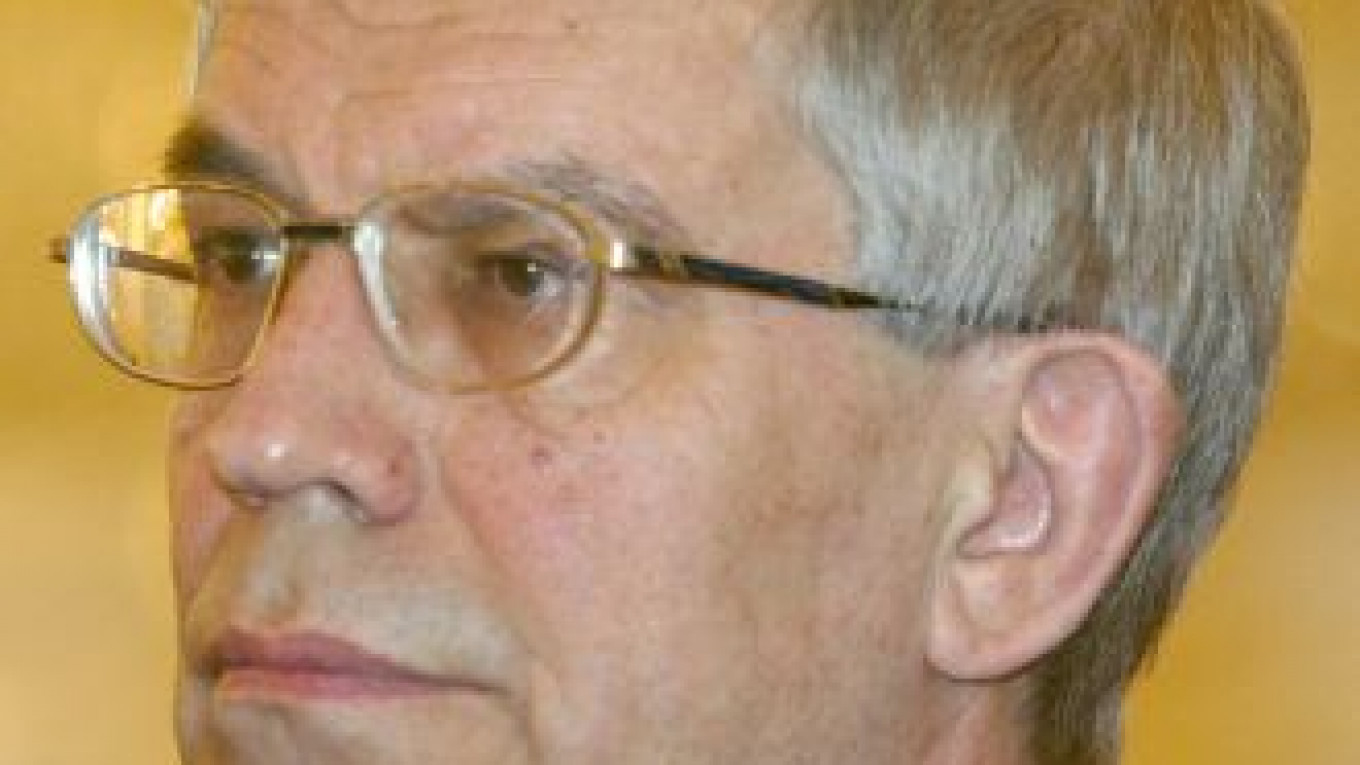The Central Bank’s main goal next year will be to keep inflation between 6 percent and 7 percent as policymakers no longer target the ruble’s exchange rate, Chairman Sergei Ignatyev said in an interview published Thursday.
"We currently don’t have any targets for the ruble’s nominal or real exchange rate," he said in the interview with Kommersant.
The bank may widen the ruble’s trading corridor, used to limit "sharp movements" in the currency, which may have even higher volatility in 2011 than this year, he said.
The bank’s inflation target for 2011 is "achievable," Ignatyev said, adding that the "very fast" growth of grain prices leads to "some worries." The government should sell its stockpiled grain on the domestic market through an exchange "in the coming weeks" after prices for milling wheat rose 17 percent from October through the start of December, he said.
Policymakers are weighing the first interest rate increase since 2008 after inflation accelerated in November to an annual 8.1 percent, the fastest in 11 months, fueled by food prices that rose after a summer drought.
The International Monetary Fund on Dec. 9 urged Russia to focus "squarely on reducing inflation" as the Washington-based lender raised its forecast for 2010 consumer-price growth to 8.5 from about 6 percent.
The Central Bank will hold a meeting on interest rates Friday. Fifteen of 16 economists polled by Bloomberg expect policymakers to hold the key refinancing rate at 7.75 percent.
The Central Bank will use tools including its rate policy and reserve requirements to curb inflation, Ignatyev said. He doesn’t support a large increase of capital requirements for lenders.
"I personally oppose a sharp increase of minimal capital requirements for existing banks," he said.
Minimum capital requirements for banks are set to rise to 180 million rubles ($5.88 million) from 90 million rubles on Jan. 1, 2012. The Central Bank hasn’t formed a common position on a proposal to further raise the requirements to as much as 1 billion rubles by 2015, Ignatyev said.
The Central Bank lowered the main refinancing rate 14 times between April 2009 and May this year. It has kept the benchmark at 7.75 percent for six months as policymakers sought to avoid damping the economy’s recovery from a 7.9 percent slump last year. Gross domestic product is set to grow 3.8 percent this year and 4.2 percent in 2011, according to the Economic Development Ministry.
The main way the Central Bank can support economic growth is by providing "low inflation" in the long term, Ignatyev said.
The Central Bank will increase its deposit rate by 0.25 percentage point when it reviews borrowing costs Friday to bolster the ruble and arrest capital outflows, VTB Capital said.
The deposit rate, which is the interest earned on rubles that Russian lenders keep with the Central Bank, will rise to 2.75 percent after the Central Bank's board meeting to review benchmark rates, economists led by Alexei Moiseyev at VTB Capital, the investment banking arm of Russia’s second-largest bank, wrote in a client note Thursday.
“The one thing they’re really concerned about, even more than inflation, is capital outflows, as they can hurt growth,” one of the economists, Alexandra Yevtifyeva, said by phone. “To prevent this they need to hike the deposit rate as it is the rate which defines the attractiveness of ruble assets.”
The regulator will then raise all of Russia’s key rates, including the refinancing rate, by 0.50 percentage point in the first quarter of next year, the note said.
A Message from The Moscow Times:
Dear readers,
We are facing unprecedented challenges. Russia's Prosecutor General's Office has designated The Moscow Times as an "undesirable" organization, criminalizing our work and putting our staff at risk of prosecution. This follows our earlier unjust labeling as a "foreign agent."
These actions are direct attempts to silence independent journalism in Russia. The authorities claim our work "discredits the decisions of the Russian leadership." We see things differently: we strive to provide accurate, unbiased reporting on Russia.
We, the journalists of The Moscow Times, refuse to be silenced. But to continue our work, we need your help.
Your support, no matter how small, makes a world of difference. If you can, please support us monthly starting from just $2. It's quick to set up, and every contribution makes a significant impact.
By supporting The Moscow Times, you're defending open, independent journalism in the face of repression. Thank you for standing with us.
Remind me later.






